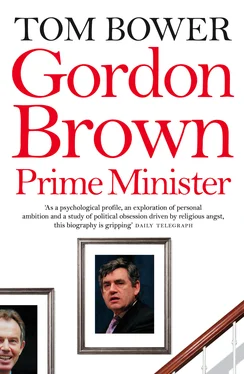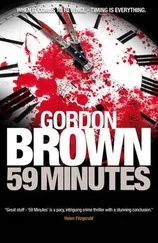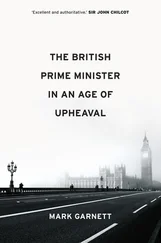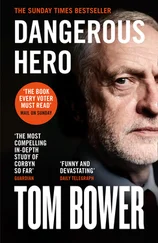1 ...7 8 9 11 12 13 ...32 Martin O’Neill, who would himself be elected to parliament in 1979, called Brown with an offer. O’Neill was chairman of the Labour Party in Leith, and he explained, ‘There isn’t a strong candidate here, and you could win a safe seat.’ Brown hesitated. ‘I don’t know,’ he replied. ‘I don’t think I can let the people in Edinburgh down.’ He expressed his fear of bad publicity after his failure to stand in Hamilton, and the probability of being tarred as an opportunist. The impression again was of indecision and fear of a competition whose outcome was, despite O’Neill’s assurances, uncertain. He sought refuge in hard work.
The first battle was to persuade the Scottish people to support devolution in the forthcoming referendum. Without uttering any overtly nationalist sentiments, he campaigned in favour of the ‘yes’ vote, speaking at dozens of meetings. Despite campaigning in the midst of widespread strikes, Brown believed he could deliver victory. Scotland, he argued, did not share England’s disenchantment with the Callaghan government. Fighting against the odds brought the best out of him. During one debate against Tam Dalyell in York Place, Edinburgh, Brown arrived after a last-minute invitation. ‘He stood up to me better than anyone else,’ Dalyell told a friend afterwards. ‘I was pretty formidable, but he had thought about it better than anyone I had met.’ Among his other opponents was Robin Cook, praised by some but damned by more, especially the former Labour MP Jim Sillars, who would later join the SNP: ‘Cook believed that he was intellectually superior to God.’ Dalyell watched the two sparring with each other. ‘They were two strong young men who knew that one of them would get in the way.’
On election day, 1 March 1979, Scotland’s airports were closed and there were food shortages. Productivity had fallen since 1974, annual wage increases were about 15 per cent and inflation was 15.5 per cent. The ‘yes’ and ‘no’ votes were evenly divided, but under the rules of the referendum the ‘yes’ vote could only be successful if it received not just a simple majority, but a majority of all those who were entitled to vote. Brown, like many in his party, deluded himself about the reasons for failure. Scotland’s new oil wealth had encouraged the belief that while England was dying, their country was being revitalised. Scottish voters, Brown failed to understand, were disenchanted by Labour. He was nevertheless optimistic about victory in the general election, which was finally called for May 1979.
Energetically he began campaigning in Edinburgh South against Michael Ancram, the Conservative candidate. His speeches were notable for their use of repetition as an oratorical strategy, and for their tidal wave of minutiae. Watching Brown’s campaign, Alf Young spotted its flaws: ‘He was always surrounded by a blitz of paper and a million bullet points. He exuded the belief that everything could be reduced to micro-targets and micro-meddling.’ His campaign ignored the widespread disgust with the strikers, and specifically rejected any increased control over trade unions, especially over picketing and unofficial strikes. Despite dozens of friends and supporters, including Margarita, working on his behalf, Brown was defeated by 2,460 votes. Later, in the party headquarters with a group including Robin Cook and Nigel Griffiths, a local activist, he confessed his devastation. Politically, Margaret Thatcher’s victory with a majority of forty-three seats was shattering. Brown was baffled by the national mood and the unexpected end of the Labour era.
The following morning, while television pictures showed Thatcher standing on the steps of 10 Downing Street quoting Francis of Assisi, Brown was slumped in a tattered armchair in Marchmont Road, surrounded by the debris of his campaign, contemplating his life until the next election. He had made a terrible mistake in refusing Martin O’Neill’s offer of a safe seat. No one congratulated him for fighting and losing. He would continue lecturing at the Glasgow College of Technology and the WEA, and would secure a junior researcher’s job on Ways and Means , a political programme produced by Scottish Television. After some complaints about the lack of political balance in his contributions he was moved to What’s Your Problem? , a weekly consumer programme exposing ripoffs by shops and local authorities. His productions were renowned less for their artistic qualities than for the efforts he took to rectify ills.
His new companion was a feisty former student at Edinburgh University, Sheena McDonald, born in Dunfermline, Fife. A brief introduction at one of his university parties by his brother Andrew had been remembered when they met again while working at Scottish Television. Dark, intelligent and fun, McDonald bore some physical resemblance to Margarita, but their characters differed sharply. She was an ambitious journalist, and prized her personal independence. Unlike Margarita, she had no intention of marrying Brown, although they had much in common. Like Brown, she was a child of the manse; her father was a former moderator of the General Assembly of the Church of Scotland.
Brown’s attitude towards women had become entrenched. He knew he was attractive. He was well built – ‘fit, with good legs’ as one admirer recalled – but he denied to himself any need to share his life with a woman, or to trust anyone beyond his immediate confidants: his two brothers, Wilf Stevenson and Murray Elder. At the end of a day he was content to go home, endlessly watch games of football on television and listen to recordings by Jessye Norman or Frank Sinatra. He was neither interested in a woman’s life nor prepared to divulge his own secrets. Confessing to any doubts or exposing his weaknesses was anathema. Nothing would be allowed to undermine his determination to portray himself as supremely self-confident. His relationship with Sheena McDonald, like his job, was temporary while he found a safe seat. The obstacles to that, however, appeared to be multiplying.
The Labour Party in England was convulsed by defeat. In the leadership elections after Jim Callaghan resigned, the left-wing Michael Foot defeated Denis Healey by 139 votes to 129. The parliamentary Labour Party had patently misread the electoral result. Rather than distancing themselves from the wild antics of the militant trade unions, a majority of Labour MPs sought to encourage them. The growing split in the English party between sympathisers of the neo-Marxist Militant Tendency and the traditional socialists only partially infected the Scottish party, but Brown’s comrades nevertheless were embroiled in bitter disagreements about personalities and ideology. ‘Anyone who can survive that viciousness,’ sighed Jimmy Allison, ‘can survive anything.’ In that battle Brown represented the traditional Tribunites on the party’s executive, the ethical socialist rather than the Marxist. He faced hard-liners including George Galloway, the son of Irish immigrants, and Bill Speirs, a future general secretary of the Scottish TUC. For hours every week they battled about the transfer of power to left-wing activists, and whether Tony Benn and the left’s caucus should be supported despite Benn’s refusal to accept collective responsibility. Resisting any dalliance with those outside the mainstream, Brown argued against factionalism and declined invitations by Galloway and Speirs to join their group in the pub after meetings. He would insist that he was engaged in intellectual rather than malicious, personalised debates, and preferred to talk with the trade unionists. Both Galloway and Speirs, he believed, were blocking his promotion and influence. They would deny any subterfuge, although neither was particularly fond of Brown. In Galloway’s opinion he was an egghead, a brainy backroom boy and a workaholic policy wonk, but not an intellectual. Galloway believed him to be ambitiously manoeuvring to build relationships for his own personal advancement, rather than trying to build a better society. ‘He’s chosen not to be a comrade,’ agreed Speirs.
Читать дальше












